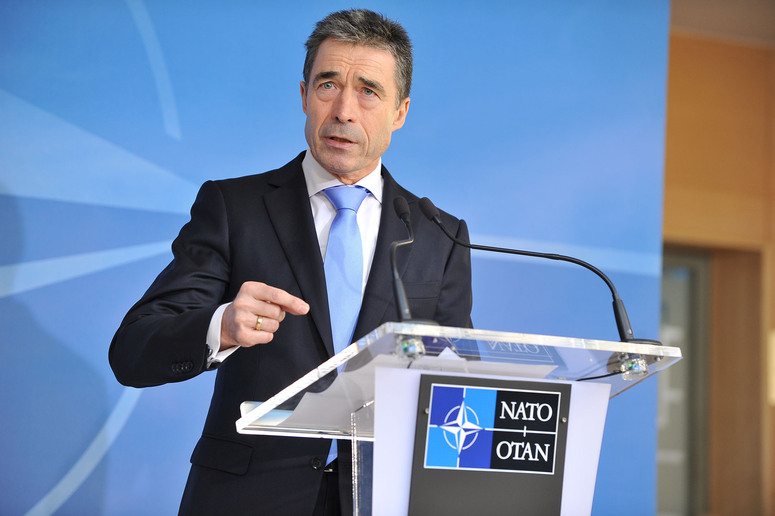Arrival statement
by NATO Secretary General Anders Fogh Rasmussen prior to the NATO Defence Ministers meetings at NATO Headquarters

Today and tomorrow, we will pave the way for our summit in Chicago, which is less than four months away.
Afghanistan is of course our top operational priority. And we are making progress. Every day, Afghan forces are growing stronger and more capable. They are leading around 40% of all combat operations. And they have started to provide security for half the Afghan population.
So our mission is going in the right direction. Our shared goal is for the Afghan forces to be in the lead for security all across the country by the end of 2014 – and we stick to that goal.
Today and tomorrow we will have a discussion about the progress we have made and how we continue to move forward with transition.
We’ll also discuss how to ensure we have the right capabilities in these hard economic times. The right approach is what we call Smart Defence – and work on Smart Defence is well underway. We are identifying capability gaps which cooperation between nations could fill, and I would expect that process to start delivering results in Chicago.
But I would also like to stress that Smart Defence is not a quick fix. It’s not a one-off. It’s about the long-term. It’s a whole new way of doing business – because this is no longer the time for business as usual.
So we’ve got a lot of work ahead. And I can take a couple of questions.
OANA LUNGESCU (NATO Spokesperson): Starting with Reuters.
Q: Yes, Secretary General, over here. David Brunnstrom from Reuters. Given the Defense Secretary Panetta remarks overnight, may I ask whether you foresee a complete end to NATO combat operations in Afghanistan by the end of 2013? And whether you think conditions will justify such a change of policy?
ANDERS FOGH RASMUSSEN: In our summit, in Lisbon, in November 2010, we outlined a road map for a gradual transition to lead... of lead security responsibility to the Afghan security forces. That decision and that road map still stand.
As you know, we have started transition last year, and so on almost half of the Afghan population will be living in areas where the Afghan security forces have taken lead responsibility. And transition continues throughout 2012. And we expect the last provinces to be handed over to the Afghan security forces by mid-2013.
From that time, Afghan security forces are in the lead all over Afghanistan. And from that time, the role of our troops will gradually change from combat to support. In that, there is nothing new.
It is of course of crucial importance that this change of role takes place in a coordinated manner within ISAF; and that this change of role takes into account the actual security situation the ground.
Today and tomorrow we will consult with Allies and partners on how best to implement this transition. These consultations will continue. And decisions will be made at our summit in Chicago.
I can assure you that the decisions we took at the last summit, in Lisbon, in November 2010 will remain the bedrock of our strategy for transition. I can also assure you that the Alliance will maintain its solidarity and cohesion and stick to its goals.
OANA LUNGESCU: Danish News Agency.
Q: (Inaudible) of Danish News Agency Ritzau. I know that the Danish minister today will invite other countries to join Denmark in buying weapons and ammunition. How does that fit into a broader agenda of Smart Defence? And on a separate issue, if I may, your comment to a story in a Danish newspaper today about NATO being taken to court on September 17th I think for the first time ever for inflicting civilian casualties in Libya?
ANDERS FOGH RASMUSSEN: On the latter, I don't have any comments. I haven't got any information about that. On the first, the Danish initiative on munitions, I really appreciate that initiative. Common acquisition, common storage of munitions are excellent examples of smart defence because it will constitute a more efficient use of resources. And actually that's also one of the lessons learned from our Libya operation in which Denmark participated actively. So I praise the Danish initiative. And I would like to commend the Danish minister of Defence for this initiative. And I would expect it to be an integrated part of the Smart Defence package to be endorsed in Chicago in May.
OANA LUNGESCU: Last question, Associated Press.
Q: Yes, NATO has always insisted that transition was never going to be driven by politics. But now it's clear that in some countries, election considerations are starting to affect that. Will NATO... will the coalition be able to weather this pressure to speed up the transition?
ANDERS FOGH RASMUSSEN: But actually there's nothing new in the fact that in a coalition of free democracies you'll always have a free and open debate on how best to proceed. We'll have that in the past. We'll have it in the future. The essence is that we're going to consult with each other. And the outcome of that process of consultation will be decisions made on the basis of consensus. And based on all I've heard and all I have seen, I think all Allies and all partners stick to the decisions we took in Lisbon: that is the roadmap leading to the transition of lead security responsibility to the Afghan completed by the end of 2014.
OANA LUNGESCU: Thank you very much. We'll see you later during the Ministerial....
